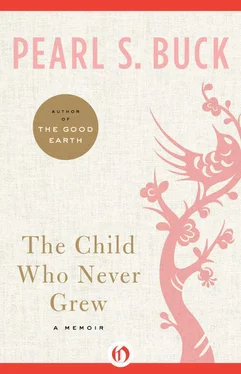The buildings were pleasant and adequate, but not nearly so handsome as some I had seen. The atmosphere was what I felt. It was warm and free and friendly. I saw children playing around the yards behind the cottages, making mud pies and behaving as though they were at home. I saw a certain motto repeated again and again on the walls, on the stationery, hanging above the head’s own desk. It was this: “Happiness first and all else follows.”
The head smiled when he saw my eyes resting on the words. “That’s not just sentimentality,” he said. “It is the fruit of experience. We’ve found that we cannot teach a child anything unless his mind and heart are free of unhappiness. The only child who can learn is the happy child.”
I knew enough about teaching to know that this is a sound principle in any education. It was comforting and reassuring to find it the cornerstone here upon which all else was built. I said to myself that I would look no more.
Upon a September day I bought my little girl to the place I had found. We walked about to accustom her to the new playgrounds and I went with her to the corner where her bed stood. I met the woman who was to be her attendant, as well as the superintendent of girls. The child clung to my hand and I to hers. What went on in her little mind I do not know, but I think some foreboding was there. We had never been separated, and the time was coming when there must be a separation almost as final as death. I would come back to see her often, and she could come sometimes to see me, but the separation was there, nevertheless. We were to be parted. Even though I believed that it was best for her safety that she find her permanent shelter here, the fact that she would need lifelong shelter was the primary cruelty.
In the afternoon of that day which was so dreadful in its passing the head asked me to come to the assembly hall. The children were all to gather there for some music. In his kindness he asked me to sit on the platform with him and to speak to the children for a few minutes about Chinese children. Some of them, he said, would understand.
There are moments which crystallize within an instant the meaning of years. Such a one came to me when I stood on the platform of that room and saw before me hundreds of children’s faces looking up to me. What heartache loomed behind each one, what years of pain, what tears, what frightened disappointment and despair! They were here for life, prisoners of their fate. And among them, one of them, my child must henceforth be.
The kind man at whose side I stood must have discerned something of what I felt, for when he saw I could not speak he told a little story and made the children laugh and I was able to go on again. I think I never tried more earnestly to interest an audience, never had I put myself so wholeheartedly into any effort as I did that half hour of talk with those children. I could not say what was in my heart. I could not tell them I understood their lives better than I understood anything else, because I had lived through such a life. I had to tell small childish things that they could grasp, and my reward was their fresh laughter.
After it was over, the head took me aside alone and talked to me gently and gravely. I have never forgotten his words. “You must remember,” he said, “that these are happy children. They are safe here. They will never know distress or want. They will never know struggle or defeat, nor will sorrow ever touch them. No demands are made upon them which they cannot meet. The joys which they can appreciate they have. Your child will escape all suffering. Will you remember that and let it be a comfort to you? Remember that there is a sorrow worse than one’s own — it is to see a beloved person suffer without being able to help. That sorrow you will never have.”
Many a time since then when I have thought of the child and the waters have seemed to close over my head, I have remembered those kind and wise words. As long as the child is happy, am I not strong enough to bear what is to be borne?
I left her there and, following the request of the school, I did not visit her for a month. The head believed that a full month was needed for the new roots to be put down, and to see the parents delayed the necessary process. They would tell me, he promised, if anything went wrong. So I tore myself away, leaving her for the first time in our lives.
Of that month I need not speak. Any parent like me will know the doubts that beset me. To leave a child who cannot write a letter, who cannot even make known in words what she feels and needs, seemed to me at times the height of cruelty. These times came in the night, and only the thought of a future with the child grown old and me gone could keep me from hurrying to the nearest railway station. Ah, well, there are many who know such hours in the night!
It would be pleasant to say that when I went back to the school at the end of the month I found the child happy and well. This was not true. Her distraught little face, her pitiful joy at seeing me brought back all the doubts again and I was ready to pack her trunk and bring her home.
The elderly matron stood looking at us. “She has been quite naughty,” she said gravely. “She has not wanted to do what the other children do and she has cried a great deal. We have had to deal with her.”
“Deal with her?” I asked.
“Yes. When she ran out of the house we had to restrain her.”
“She is used to freedom,” I murmured. “And of course she was running out to look for me.”
“She cannot run outside alone,” the matron said, “and she must learn to obey. When she learns, she will be happy as the others are.”
Protest was thick in my throat, but I choked it back. “I will take her out for a little walk,” I said.
As soon as we were outside and alone she was as happy as a songbird again, but she clutched my hand as though she would never let it go. I went in search of the head. He was there in his office and he welcomed me and spoke to the child. She seemed to know him and not be afraid of him, and this meant he had been to see her himself.
I began at once. “I think I cannot leave her here,” I told him. “The matron says that they have had to restrain her, whatever that means. But surely they understand that a little child like this cannot suddenly be happy without the home she has always had. She has never been among strangers. She cannot understand why her life is completely and suddenly changed. Do the children have to be forced into a routine? Must they walk in line into the dining room, for example?”
This and much more I said. He let me say it all while his eyes were kind upon us.
“It is not possible for your child to live here exactly as she has in your home,” he said when I had finished. “Here she is one of many. She will be individually cared for and watched and taught, it is true, but she cannot behave as though she were the only child. This will mean some loss of freedom to her. This loss you must weigh against the gain. She is safe here. She has companionship. When she learns to fall in with the others in the small routines that are necessary in any big family, she will even enjoy the sense of being with the crowd. She has to learn, you know. But rest assured that she will be taught only those things which she is able to learn and nothing will be forced on her that is beyond her.
“Try to think of what she will be a year from now, five years from now. Try to consider justly whether this place is the right one for her home. Don’t lose a larger value in some small present dissatisfaction.”
I said, “It is so hard because she doesn’t understand why it is all necessary or that it is for her good.”
“None of us really understands why,” he said in his same gentle voice. “You do not understand why you have had to have the child like this at all. You cannot see that there is any good in it anywhere.”
Читать дальше












